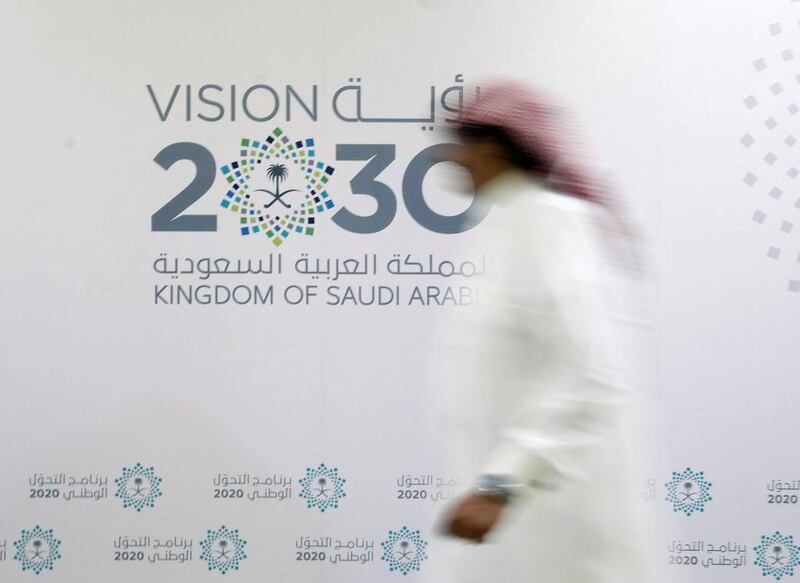The big one-off events scheduled in the UAE and Qatar over the next six years will have a positive effect on the regional economy, although Saudi Arabia’s transformation programme is more important if it achieves its aims.
This is the broad conclusion of a survey of senior business leaders in Saudi Arabia and the UAE carried out exclusively for The National by Borderless Access, a Bangalore research firm.
When asked if Expo 2020 in Dubai, the Fifa World Cup in Qatar in 2022 and the Vision 2030 programme to transform the Saudi economy would be the main drivers of the regional economy in the coming years, 42 per cent of Saudi respondents strongly agreed, with another 35 per cent simply agreeing with the statement.
The respondents in the UAE were more reserved about the effect of the initiatives, with 33 per cent strongly agreeing and 41 per cent simply agreeing.
There is a strong majority agreeing that these initiatives will support business sentiment in the likelihood that oil prices recover only slowly over the period.
“Whenever there are large-scale and high-visibility national initiatives or global events focused towards a region, we have seen consumer sentiments trending higher,” said Dushyant Gupta, the senior vice president at Borderless Access. “These poll results show similar trends across both markets, and hence the effect being more regional than localised.”
The poll also underlines the differences between the two countries, particularly the more diversified UAE economy versus Saudi Arabia’s urgent need to move away from its greater dependence on oil.
“The survey, in our view, broadly reflects the reality of the coming few years in both countries,” said Edward Coughlan, the head of Middle East and North Africa analysis at BMI Research, a business intelligence firm in London. “The UAE is both less exposed to fluctuations in hydrocarbons prices than Saudi Arabia, and the Expo is far smaller in scope than Saudi Arabia’s Vision 2030.”
But there is no doubt that Expo 2020 will advance the travel and leisure sector, even if estimates of its effects differ. The Expo 2020 Executive Body, which oversees the event, has estimated that it could add Dh89 billion overall to the UAE economy and create more than a quarter million jobs.
Rabia Yasmeen, a tourism and retail analyst at the research company Euromonitor International in Dubai, said visitor numbers to the UAE were expected to increase by 39 per cent – by 8 million to about 28 million – by 2020.
“While the country prepares for the Expo 2020, we expect shopping by international tourists to increase by up to Dh7.9bn,” she said.
“During the next five years Euromonitor sees the completion of various tourist attractions, notably Dubai Parks and Resorts and Dubai Water Canal.”
The Expo runs from October 2020 to April 2021 and Dubai Tourism has said it expects 25 million visitors over the six-month period, 70 per cent from abroad. That would mean an addition of more than 17 million visitors, which would vastly exceed the previous events in Milan and Shanghai.
But Mohamed Zein, a consumer analyst at Renaissance Capital, said the event could improve visitor numbers by 10 million – in line with Euromonitor’s estimates.
The real question for the UAE’s leisure sector is the longer-term effect and how successful companies such as Dubai Parks are at attracting visitors. “About 3 billion people – 40 per cent of the world’s population – live within a four-hour flight to Dubai, [and] many of these people neither have world-class parks, nor access to any within the convenience of a four-hour flight,” Mr Zein said.
Expo 2020 and the World Cup in Qatar, which Mr Zein estimates could bring in 250,000 visitors to the UAE, are opportunities to create repeat customers for new attractions such as the Bollywood and Six Flags parks.
Mr Coughlan said: “The UAE’s economy has many other moving parts outside of the Expo or oil. For example, growth in international tourism, the opening of Iran’s economy – which Dubai is very well placed to benefit from – and its property market, which will drive economic performance.
“The economic effect of expos in general is quite small. They rarely cause a jump in tourist numbers over the long term, and a lot of the infrastructure development is needed anyway.”
amcauley@thenational.ae
Follow The National's Business section on Twitter





